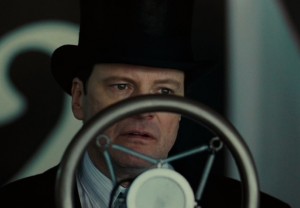Over the past week I’ve been doing my homework for the Academy Awards, working my way through the Best Picture nominees. I have enough old-school lead in my shoes to still drag my feet when it comes to the list’s expansion to ten titles: since 2009, the lineup has seemed a little less … elite. On the other hand, I’m new-school enough to recognize that, in this context, “elite” is just another word for “canon fodder,” and if there’s more room in the pool, the diversity of our celebrated archives can only increase. (Unless we adopt the cynical view that it’s all the same brand of sausage, in which case, I suggest skipping the media middleman and just eating some sausage.) With this round of nominations, at least, I savored the grab-bag effect, the ten films up for Best Picture a satisfyingly strange mixture of tastes. Leading up to the Oscars, I will post some quick thoughts on the nominees.
The King’s Speech
On Facebook I called this film “Lacanian,” triggering a long chain of comments — proof less of my throwaway profundity, I know, than of the internet’s global function as a text generator, an explosive growth medium for words compared to which the linkless and un-live petri dish of the prior epoch, Gutenberg’s, now looks a limited arena indeed. (Funny, just a few decades ago it seemed the size of the universe.) As a friend pointed out recently on this very blog, the invocation of Lacan is itself another kind of lexical kudzu, and even if you threatened me with captation, I couldn’t name a specific teaching of the Master’s that applies to The King’s Speech.
Yet a Lacanian thing it remains, and here is why: it is explicit, clinical, and unsparing in its knotting of language, (royal) authority, and fathers – its title in French could be Nom du pere. Watching Colin Firth struggle, strangle, to find his voice, one is reminded that whether or not the subaltern speaks, “superaltern” status is determined first by the seizing of language. The triumphant surge of jouissance generated by the new King’s successful navigation of his radio address has a phallic rush to it — the story is a castration in reverse — but it is a tragic trap George VI finds himself in at the end, subject of a discourse inherited from his father as surely as the British are subjects of him.
Having watched a few episodes of the HBO miniseries John Adams directed by Tom Hooper, I notice the director has a characteristic way of shooting dialogue: shot-reverse-shot constructions in which the interlocutors’ heads are positioned to far right and left of their respective frames, so that if you superimposed them you would get a two-shot. Edited together, the sequences have a lovely rhythm, the back-and-forth of the conversation built on a seesawing center of visual gravity. With Colin Firth and Geoffrey Rush playing two halves of what is essentially a single, sundered subjectivity, the effect is as though Bergman’s Persona had been recast with men, its splitscreen compositions opened out in time.
It would make a great screening for a course on new media — especially one whose syllabus takes seriously the axiom that all media are new in the time of their introduction. Fascinated to an almost Cronenbergian degree by the alien apparatus of the microphone and radio dial, The King’s Speech flirts with science-fictional status in its dissection of the transformative cultural and political impact of emergent information technologies and the social protocols in which they are swaddled. Like Gunga Din (George Stevens, 1939), whose plot is set in motion by the disruption and repair of a telegraph line in India through which colonial British messages travel, The King’s Speech understands that power and communication find their inextricable nexus in the media machines that distribute that other machine, language.

